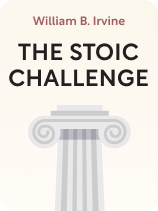

This article is an excerpt from the Shortform book guide to "The Stoic Challenge" by William B. Irvine. Shortform has the world's best summaries and analyses of books you should be reading.
Like this article? Sign up for a free trial here.
Do you experience adversity often? Do your strategies for overcoming adversities fail?
William B. Irvine says that the Stoics perceived adversity not as a setback, but as a training ground, an opportunity for growth. We’ll explain Irvine’s take on adversity—what it is, how we typically respond to it, and why those responses don’t work.
Let’s look at how people typically handle adversity in life, and why it doesn’t work.
We All Experience Adversity
According to Irvine, our lives are defined by the constant presence of one thing: adversity. It affects us all and takes on numerous forms, from spilled coffee and stressful deadlines to the loss of a loved one or a failure to graduate from university.
(Shortform note: The Stoics’ intuition that adversity in life is ever-present evokes a central tenet of another ancient way of life—Buddhism. According to the Buddha, the First Noble Truth (one of the four statements at the core of Buddhist thought) is that suffering, or dukkha, is universal and constant. Both philosophies share the fundamental realization that life is inherently fraught with challenges and adversities; but as we’ll see, each offers different solutions.)
The key feature of such adversities, Irvine says, is that we can’t always see them coming or prepare for them. Troubling events ranging from mundane daily challenges to significant, life-upending events are often unpredictable. Further, they have a variety of sources:
- We cause ourselves trouble, such as by failing to anticipate obstacles (for instance, a freak blizzard in April) or behaving in ways that create difficulty (such as by living in a messy, disorganized house).
- Other people cause us trouble, such as by getting into arguments with us, disrupting our plans, annoying us, or making choices that hurt our livelihoods or well-being.
- The natural world causes trouble, such as when the weather causes the power to go out or, more seriously, when the crops fail or a hurricane devastates your home.
(Shortform note: Irvine’s taxonomy of adversities again suggests the Buddha’s analysis of dukkha. Buddhism highlights three types of suffering: dukkha-dukkha (painful experiences), viparinama-dukkha (suffering due to change), and sankhara-dukkha (suffering due to the unsatisfactory nature of existence). Comparing these to Irvine’s types, the first often manifests as miseries arising from our and others’ actions. The latter two include adversities caused by factors beyond our control, like the natural world’s upheavals.)
We Handle Adversity Poorly by Default
Though our lives are filled with adversity, Irvine contends that by default, most people aren’t good at handling it. When some trouble comes along, people typically respond by getting upset. This can take a variety of forms, ranging from fear and anxiety to frustration, anger, or outright avoidance of the problem and how they feel. For example, if someone loses his wallet in a busy part of the city, he might react by fretting about someone stealing his cash or feeling angry about this unexpected inconvenience.
(Shortform note: Although Irvine notes that our default reactions to adversity aren’t effective, those reactions aren’t really anyone’s fault. We evolved to react to stressful situations with the fight-or-flight response, a hormonal activation that kicks into action a host of physiological functions that make you breathe faster and leave you feeling wound-up and ready to act. Given this, take Irvine’s comment less as a moral judgment and more as an observation that, with practice, we can understand and improve upon our standard wiring for stress responses.)
According to Irvine, each of these reactions to adversity is a different way of externalizing the problem: We look for something outside of ourselves to blame. If someone is fearful or anxious, he might feel victimized—“why me, why does life do this to me?” If he’s instead frustrated or angry, he might feel attacked or targeted by misfortune—“I don’t deserve this. This is unfair!” In either case, Irvine says, these are ineffective responses to adversity:
- When you get angry, you harm yourself and those around you. Anger clouds your mind, making it difficult to solve the problem and, at the same time, putting you into a state of acute distress that can spread to others.
- When you grow fearful, you shrink away from effective action and hide within your comfort zone. You never learn to face life’s challenges and thereby grow small, less resilient, and weak of character.
(Shortform note: Irvine’s ideas about the emotional harm of ineffective responses to adversity underscore the necessity of emotional intelligence (EI), a concept popularized by Daniel Goleman in Emotional Intelligence. Goleman argues that EI—which encompasses self-awareness, self-regulation, and empathy—helps you to understand, manage, and effectively navigate your emotions. In doing so, you can avoid the harm that, according to Irvine, comes when you mismanage your response to adversity.)
As to more significant adversity, Irvine says that in the aftermath of real loss (such as the death of a loved one or the end of a romantic relationship), we often get too wrapped up in our grieving. Traditionally, the Stoics acknowledged a small amount of grief as necessary but argued that any more came from self-centered guilt and a desire to make your sadness known so that others would comfort you. Further, Irvine says that grief counseling can undermine your resilience by coddling you when you could instead be growing tougher.
(Shortform note: Irvine’s “tough love” stance toward grief, which emphasizes independent resilience, contrasts with current psychological theories on grief counseling. These theories often advocate involving yourself in your emotions in order to fully process what you feel. Studies suggest that grief counseling can work, helping people to cope with, accept, and grow past difficult events. While this contradicts Irvine’s contention that you need resilience training or you’ll become weak, it’s reasonable to infer that there’s more than one way to navigate loss. For any person, either method—or another altogether—may work.)

———End of Preview———
Like what you just read? Read the rest of the world's best book summary and analysis of William B. Irvine's "The Stoic Challenge" at Shortform.
Here's what you'll find in our full The Stoic Challenge summary:
- How you can minimize suffering by reframing it
- How you can use the Stoics’ strategy in your everyday life
- Why you should take any good fortune in stride






